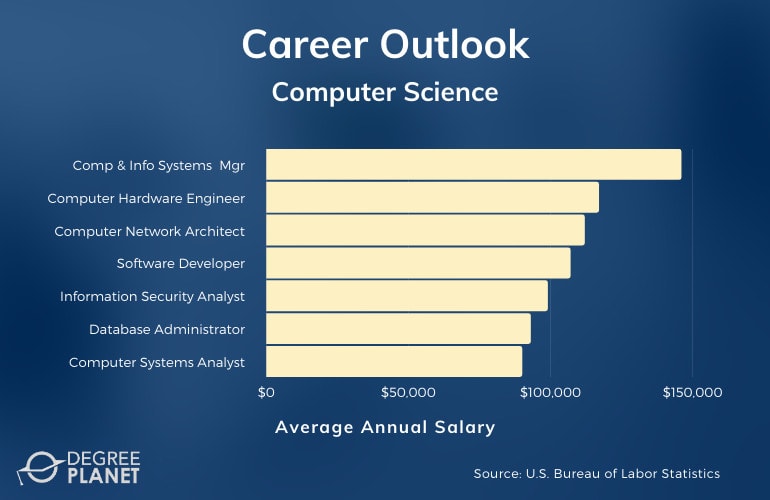Is a computer science degree worth it? Almost everything is becoming digital and connected through the internet of things (IOT).

Homes, cars, retail sales and shopping, advertising and branding, job searching and learning, office processes and factory floors, gaming and sports, cars and transportation, entertainment—all of these are increasingly software driven.
With a degree in computer science you may enter the field with more confidence and continue learning on the job, opening new opportunities for better jobs and better pay down the road.
Editorial Listing ShortCode:
And, since more and more industries are developing specific software applications, you may look for software jobs in virtually every sector. But software is only part of the picture…
The IOT revolution is driving demand for qualified hardware network specialists and for lots of capable teachers and trainers. If you like math and logical and analytical thinking, getting a degree in computer science may deliver you lots of job options for years to come and rewarding earnings.
Is a Computer Science Degree Worth It?

Yes, a bachelor’s degree in computer science is worth it for many students. According to the Bureau of Labor Statistics, computer and information technology jobs are set to grow at 11% over the next 10 years, much faster than the average for all occupations.
Common careers in this field include computer programmer, computer systems analyst, software developer, information security analyst, data analyst, and web developer.
Editorial Listing ShortCode:
Since more and more industries rely on a growing number of software tools for all aspects of their business—product development, communications, collaboration, back-office processes, advertising, customer retention, strategic planning, and more—a computer science degree can help you gain access to many kinds of software jobs:
- Software Applications
- Software Engineering
- Software Development
- Software Testing
- Cyber Security
- Software Training
Then there’s the hardware side of this fast-growing field… Companies, schools, industrial plants…they all need help with software infrastructures:
- Maintaining, expanding, and developing hardware networks
- Engineering websites and integrating sites, processes, and digital tools
- Configuring and applying data across more and more domains and strategic efforts
- Integrating hybrid data storage and transmission networks (local and cloud based)
As you can see, with your traditional or online computer science degree, you should have many opportunities to find well-paid work in computer and software enterprises as well as other sectors and settings, including education, government, automotive, energy, advertising, nonprofits, and more.
How to Decide Whether a Computer Science Degree is Right for You

Though it seems the computer science field will grow with no end in sight, it doesn’t mean it’s right for everyone—here are some reasons a computer science degree, or even a post baccalaureate computer science online degree, might be a good choice for you:
1. You already like working with computers.
Maybe you clearly enjoy being around computers, tinkering with them, or trying to “hack” software in your spare time!
If this is you, getting a degree in computer science may be a great way to explore which computer science specialties most interest you while gaining credentials and applicable skills for a rewarding job search.
2. You have a computer job but don’t have a degree.

During the past decade, computer science jobs have been in such demand that many people “fell” into some of these positions because they had analytic aptitudes and the drive and curiosity to learn on their own.
If you are one of these people, you may be new to the field or you may be a bit older and have been working in the same job for many years.
Editorial Listing ShortCode:
In either scenario, if you find yourself ready for a better paying job and a more dynamic career path, then a bachelor’s degree with an accredited school may help you get cutting-edge insights and the recognition needed to qualify for more of the jobs that most interest you.
3. You have math and analytic skills and want a degree that’s both challenging and practical.

If you are science oriented and wondering about what to study, we find it hard to imagine a better time to get a bachelor’s degree in computer science. Again, working with computer networks, doing hours of software programming, or spending lots of time analyzing big data files…are not for everyone.
But if you have a knack for math and like analytical logic and problem solving, and you’re wondering how to match these aptitudes to a growing and lucrative job market, then a degree in computer science may be one way to go.
5 Things You Can Do with a Computer Science Degree
Computer science encompasses lots of high-demand job roles across a range of industries. Here are some specific things you can do after learning more about computer science:
1. Software Developer

Being a software developer means helping to create the code that will turn someone’s idea for a new application into reality.
In some cases, you might also, of course, help design or conceptualize these new applications. In other jobs you might be tasked with relentlessly writing and troubling shooting software code.
Analytical skills and an ability to work independently and collaboratively can be helpful in these roles. You may develop and apply expertise in one or more specific software languages and architectures.
2. Systems Network Architect

Today’s computer systems integrate both hardware systems and software applications as well as end-user interfaces. As a network architect, you may use your skills to maintain and trouble-shoot networks and manage upgrades and network expansion projects.
Since innovation is the name of the game in digital products and infrastructures today, there should be significant demand for talented individuals who can manage the complex challenges of keeping these networks operating smoothly while helping companies keep pace with innovation.
This may be a good job for someone with computer training who also likes project management challenges.
3. Information Security Analyst

As more and more data migrate online and into the cloud, growing threats to data security are ramping up demand for qualified cybersecurity product developers.
Among those who buy these products, there is an urgent need for in-house cybersecurity associates who can monitor security software and security threats and help identify and implement the appropriate cybersecurity tools.
4. Computer Programmer

It’s one thing to make software programs, but then there’s also the work of configuring and optimizing the operation of these various software programs and digital tools and processes for specific users on different types of computer platforms.
This is where computer programmers come into the picture. Some computer programmers will find work in companies that develop, manufacture, and sell computer technologies. But that’s only one slice of the job market Most companies with complex software tools and networks also need in-house computer programmers.
Editorial Listing ShortCode:
In these jobs you may help identify useful software applications, upload new software onto large networks, and keep digital tools running efficiently and displaying correctly on networked desktop computers, tablets, and mobile devices.
5. Web Designer

Today, virtually every business, school, government agency, or self-employed professional has their own website. Many businesses or agencies also create unique websites for special promotions and outreach.
In other words, new websites and new web content are growing exponentially and web designers are needed to help integrate the text and image content and navigation links, so these sites look fantastic and are supported by the proper software coding, customer engagement apps, and database integrations.
Keep these options in mind…They can help you figure out if a degree in computer science is worth it and if it’s right for you. If you do decide to go this route, knowing a little bit more about where you want to land after getting your degree can help you choose the right online program.
Computer Science Degree Alternatives

Depending on your specific skills, interests, and career goals, you may want to consider these close cousins to computer science, each offering access to computer-related job growth with slightly different course concentrations and job pathways:
- Bachelors in Engineering. Many engineering jobs also involve integrating digital tools into new products and processes. You can pursue an engineering degree with a concentration in computer engineering, mechanical engineering, industrial engineering, or aerospace and transportation network engineering.
- Bachelors in Mathematics or Statistics. The growing applications for complex data analysis may provide growing opportunities for specialists in math and statistics to apply their skills in computer-science innovations and applications across private and public domains. More advanced math skills may also be needed for the development of more complex artificial intelligence software tools and algorithms.
- Bachelors in Data Science. Digital innovations are providing business leaders and government agencies with new opportunities to harness and capitalize on “big data.” As these trends accelerate, there is likely to be demand for qualified workers who can help their employers adopt appropriate software tools and execute big data strategies.
Whatever your specific aptitudes and analytic skills, you will likely find that computer science innovations require both skilled engineering work and complex data analysis skills as technology trends continue to disrupt today’s economy.
Computer Science Careers & Salaries

According to the Bureau of Labor Statistics, here are some of the many career paths you might follow and the kinds of salaries you can work toward with your bachelors in computer science:
| Careers | Annual Median Salary |
| Computer and Information Systems Manager | $151,150 |
| Computer Hardware Engineer | $119,560 |
| Computer Network Architect | $116,780 |
| Software Developer | $110,140 |
| Information Security Analyst | $103,590 |
| Database Administrator | $98,860 |
| Computer Systems Analyst | $93,730 |
| Computer Programmer | $89,190 |
| Network and Computer Systems Administrator | $84,810 |
| Web Developer | $77,200 |
As you can see, a bachelor’s in computer science can help open the door to lots of jobs with great salaries—salaries that that you might earn on day one or higher salaries that you can set your sights on as your work experience qualifies you for more senior roles over time. That is why a master’s in computer science is worth it for many students. It can help get you one step closer to more lucrative positions.
What Kind of Jobs Can You Get With a Computer Science Degree?

A bachelor’s degree in computer science may be your ticket to a vast field of information technology jobs.
You may look for jobs in software and computer development as such or provide badly needed computer support and know-how in virtually any kind of networked office environment.
If you like teaching as much as technology, you may find a role in the IT economy teaching computer skills and computer science classes or working as a corporate trainer.
Editorial Listing ShortCode:
With an engineering concentration and an interest in computer science, you may work in computer engineering or in any number of roles involving the integration of digital tools and solutions, including aerospace, business data analytics, health care, education, industrial engineering and robotics.
If you have design skills and artistic gifts, you might enjoy putting your aptitudes to work in user-interface design, digital advertising, or website design and development.
Is Computer Science a Good Major?

If you have a math background and enjoy engineering and analytic tasks, computer science may be a good major for you and one that opens up an innumerable number of job opportunities in a fast-growing field.
Even if you already know a lot about computers or already work in the field without a degree, by majoring in computer science, you may have access to more jobs and be a more competitive candidate.
Getting Your Computer Science Degree Online

The truth is we don’t even know, no one does, what kinds of computer science innovations will take place over the next ten years.
The expansion of the cloud, big data, digital payments, online retail, education, healthcare, and self-driving cars—to name only a few—are expected to drive explosive demand for skilled computer scientists in all kinds of job roles.
Indeed, getting a bachelors in computer science may feel like jumping on to a speeding train. And, getting started may not be as hard as you think… There are many online programs offering flexible start dates, varied concentrations, and convenient study schedules.
Why not hitch a ride and start your computer science adventure today.

